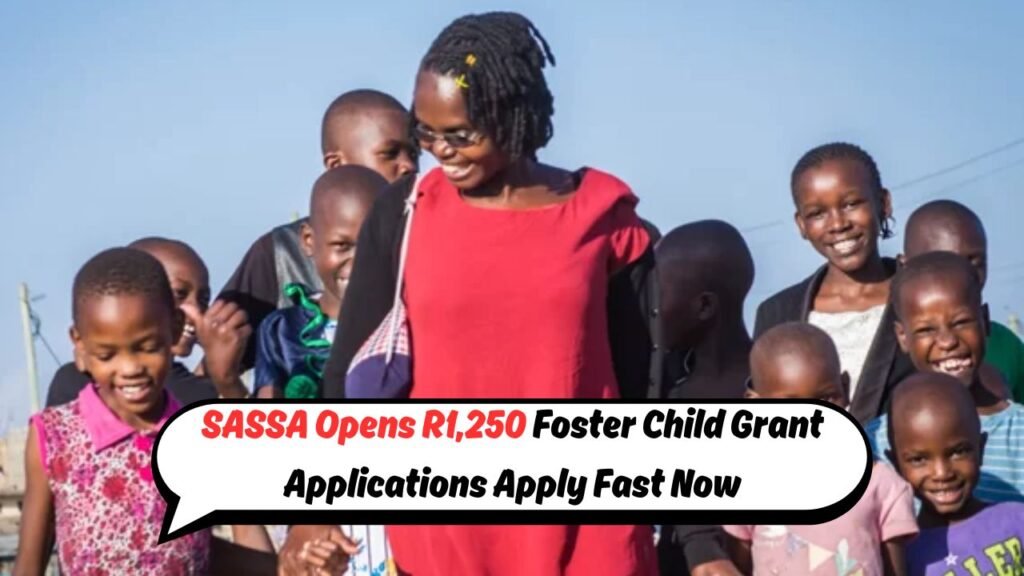R1,250 SASSA Foster Child Grant Applications: The South African Social Security Agency (SASSA) has recently announced that applications for the R1,250 Foster Child Grant are now open. This initiative aims to provide financial support to those who have taken on the responsibility of caring for foster children. With the rising costs of living and the added expenses of caring for an additional child, this grant can significantly ease the burden on foster parents. It’s crucial for eligible guardians to seize this opportunity and apply before the deadline to ensure they receive the necessary financial assistance.

How to Apply for the R1,250 SASSA Foster Child Grant
Applying for the R1,250 SASSA Foster Child Grant is a straightforward process, but it requires attention to detail to ensure all requirements are met. Applicants must first gather essential documentation such as the foster child’s birth certificate, a certified copy of the court order placing the child in foster care, and the applicant’s South African ID. These documents are crucial for verifying the eligibility of both the foster child and the guardian. Once the documentation is complete, applicants can proceed to their nearest SASSA office to submit their application. It’s advisable to arrive early to avoid long queues, as SASSA offices can be quite busy during the open application period. Additionally, applicants can inquire about the possibility of online submissions, which may be available in certain regions, providing a more convenient option for those unable to visit an office in person.
Eligibility Criteria for the Foster Child Grant in South Africa
To qualify for the Foster Child Grant, applicants must meet specific eligibility criteria set by SASSA. The primary requirement is that the child must be legally placed in the care of a foster parent through a court order. This legal arrangement ensures that the child’s welfare is being monitored by the appropriate authorities. Furthermore, the foster child must be under the age of 18 at the time of application. Foster parents themselves must also meet certain conditions, such as being a South African citizen or permanent resident. It’s important for applicants to understand these criteria thoroughly, as any discrepancies or missing documentation could result in a delay or denial of the grant. The grant not only provides financial aid but also reinforces the importance of legal and stable foster care arrangements, ensuring that children are placed in a safe and nurturing environment.
The Impact of the R1,250 Grant on South African Families
The R1,250 Foster Child Grant plays a vital role in supporting South African families who have opened their homes to foster children. This financial assistance helps cover essential costs such as food, clothing, education, and healthcare, which are crucial for the well-being of the child. For many families, the grant bridges the gap between limited resources and the growing needs of a foster child, thereby alleviating some of the financial strain. Moreover, the grant serves as an acknowledgment of the commitment and dedication of foster parents, who provide a stable and loving environment for children in need. By supporting these families, the grant contributes to the broader social goal of reducing child poverty and improving child welfare across the country. It’s a testament to the government’s recognition of the invaluable role played by foster parents in nurturing the next generation.
Don’t Miss the Deadline for the SASSA Foster Child Grant
With applications for the R1,250 SASSA Foster Child Grant now open, it’s imperative for eligible guardians to act swiftly to meet the deadline. The open period for applications can vary, and missing the cutoff date could result in a missed opportunity for financial support. Applicants are encouraged to stay informed about the specific deadlines by regularly checking updates from SASSA through official channels. This proactive approach ensures that they have ample time to prepare the necessary documentation and complete their applications. Missing the deadline could mean waiting until the next application cycle, which might be months away. Therefore, timely action is crucial to ensure that foster families can continue providing the best possible care for the children they support. By meeting the deadline, foster parents can secure the grant and, in turn, provide a better quality of life for the children in their care.


